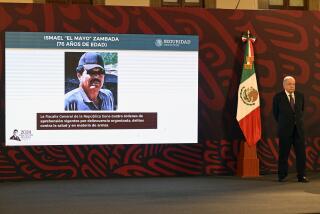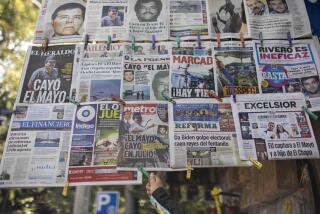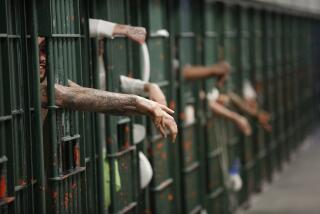Mexico Reins In Drug Ring Suspect : Fugitive: Jailers promise to keep Daniel Fowlie in his cell pending extradition after U.S. authorities protest his periodic releases from a Baja prison.
- Share via
Mexican authorities have vowed to keep the alleged patriarch of an Orange County drug ring imprisoned while he battles extradition and not allow him to be released to take care of personal business, a U.S. Department of Justice official said Wednesday.
Paul S. Vaky, an attorney in the department’s Office of International Affairs, said he contacted high-ranking Mexican officials last week to discuss periodic releases granted to Daniel James Fowlie, 57, a fugitive wanted in Orange County on 49 drug charges.
Since his capture by Mexican agents south of Acapulco in 1987, Fowlie has been incarcerated in Centro de Readaptacion Social on the dusty outskirts of La Paz about 140 miles northeast of Cabo San Lucas.
The Times reported two weeks ago that Fowlie, who has been contesting his extradition for three years, has been granted furloughs to go marlin fishing, visit his beachfront house and work on real estate projects in Cabo San Lucas, a popular resort town on the southern tip of Baja California.
Mexican and U.S. Embassy officials say that U.S. citizens detained in Mexican prisons while contesting their extraditions to the United States are not supposed to be released until the proceedings have concluded.
Vaky said he was given assurances by Mexican law enforcement authorities “that the situation regarding Fowlie’s incarceration will be remedied.”
A spokesman for Mexico’s Foreign Ministry said the prison warden has assured authorities that Fowlie had not been released from prison pending his extradition case.
“There have been no improper leaves, and Mr. Fowlie will not leave the prison until he leaves to go to the United States as an extradited prisoner,” he said.
Meanwhile, attorneys for the Office of International Affairs are reviewing their options in Fowlie’s extradition case in an attempt to get him back to face the charges as soon as possible. Vaky said he will try to check on the matter weekly.
A criminal complaint filed in U.S. District Court in Los Angeles alleges that Fowlie smuggled hundreds of thousands of pounds of marijuana and lesser amounts of cocaine into the United States from Cabo San Lucas.
Prosecutors contend that he and others stored and processed the drugs at warehouses in Orange County and at Rancho del Rio, a 213-acre property he owned on the border of Orange and Riverside counties. President Bush used the secluded ranch as a backdrop for national address on drug abuse last summer.
So far, five people, including Fowlie’s two sons, have been convicted and law enforcement authorities have taken control of the ranch in accordance with federal asset seizure laws.
Fowlie, who has been out of the United States for most of 16 years, denies the charges and claims his ranch was confiscated illegally. He never showed up in court, however, to contest the seizure.
Fowlie said he is on the brink of winning his extradition fight because of a court decision in his favor last December. Because of that ruling, he said, prison authorities occasionally have released him under armed guard for several days at a time.
Fowlie has told The Times that he was granted periodic releases from prison in 1987. The privileges were suspended in 1988, he said, but resumed in December, 1989, when he was let out for Christmas. Since then he has been released only a handful of times, he said.
But U.S. Embassy officials say they believe Fowlie has been granted furloughs at least since November, when a consular official demanded to see him at the prison and was told Fowlie had been released for a few days. Staff writers Ron Ostrow in Washington and Juanita Darling in Mexico City contributed to this story.
More to Read
Sign up for Essential California
The most important California stories and recommendations in your inbox every morning.
You may occasionally receive promotional content from the Los Angeles Times.














